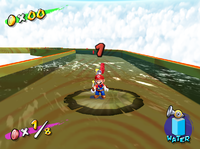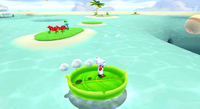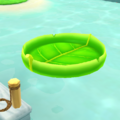Leaf raft: Difference between revisions
m (Text replacement - "Mario" to "Super Mario") |
|||
| Line 26: | Line 26: | ||
==Names in other languages== | ==Names in other languages== | ||
{{foreign names | {{foreign names | ||
|Jap=リーフボート<br>''Rīfu Bōto''<br>{{hover|葉|は}}っぱボート<ref>''Super Mario Galaxy 2'' Japanese instruction booklet, page 27.</ref><br>''Happa Bōto'' | |Jap=リーフボート<br>''Rīfu Bōto''<br>{{hover|葉|は}}っぱボート<ref>''[[Super Mario Galaxy 2]]'' Japanese instruction booklet, page 27.</ref><br>''Happa Bōto'' | ||
|JapM=Leaf Boat | |JapM=Leaf Boat | ||
|ChiT=蓮葉舟<ref>Official Chinese manual for ''Super Mario Galaxy 2'', page 27.</ref> | |||
|ChiTR=Liányè Zhōu | |||
|ChiTM=Lotus Leaf Boat | |||
|Ger=Blattboot | |Ger=Blattboot | ||
|GerM=Leaf Boat | |GerM=Leaf Boat | ||
|Ita=Barca Foglia<ref>'' | |Ita=Barca Foglia<ref>''Super Mario Galaxy 2'' Italian instruction manual, pag. 27</ref><br>Foglia zattera<ref>''[[Super Mario Bros. Encyclopedia|Super Mario Bros. Enciclopedia]]'', pag. 106</ref><br>Zattera Ninfea<ref>''[[Super Mario Bros. Encyclopedia|Super Mario Bros. Enciclopedia]]'', pag. 171</ref> | ||
|ItaM=Leaf Boat<br>Leaf raft<br>Lily-pad Raft | |ItaM=Leaf Boat<br>Leaf raft<br>Lily-pad Raft | ||
}} | }} | ||
Revision as of 21:26, June 11, 2023
| Leaf raft | |
|---|---|
Texture from Super Mario Sunshine | |
| First appearance | Super Mario Sunshine (2002) |
| Latest appearance | Super Mario 3D All-Stars (2020) |
- “Since the lake's been like this, the leaf boats have all rotted. They fall apart when you get on them now. That's...not good.”
- —Pianta, Super Mario Sunshine
Leaf rafts (also capitalized in the Super Mario Galaxy 2 manual[1] and previously referred to as leaf boats in Super Mario Sunshine) are floating rafts made of giant leaves. They appear in a few Super Mario platformers.
History
Super Mario Sunshine

Leaf boats first appear in Super Mario Sunshine, appearing in some areas of Bianco Hills as well as the Lily Pad Ride secret area. To use one, Mario must jump on one, and then use FLUDD to push the leaf boat in the direction he wishes to go. The leaf boat then begins to move forward, and continues to do so until Mario stops spraying, gradually slowing to a stop after that point. In The Secret of the Dirty Lake and the Lily Pad Ride, the leaf boats are brown from the poison water they are in and begin to slowly wilt away when Mario lands on them, eventually disappearing.
Super Mario Galaxy 2
Leaf rafts reappear in Super Mario Galaxy 2 in the Starshine Beach Galaxy. They behave similar to their appearance in Super Mario Sunshine, but due to the absence of F.L.U.D.D., are now controlled by stepping along the edges the player wants to move them. Relating to this, they now have a high ridge along their perimeters to prevent the player from walking off the edge. They have also been redesigned to look like fallen tree leaves, having a stem on the side and a pointed edge across from it.
A Pianta in this galaxy opens his "leaf raft shop" for business in the mission Climbing the Cloudy Tower, which is the only time they can be used. The player can use them to cross the large body of water in this galaxy without actually touching the water. This is essential in the aforementioned mission, where the player as Cloud Mario or Cloud Luigi must ride across the water using leaf rafts to successfully reach the large tower where the Power Star is located.
Gallery
Names in other languages
| Language | Name | Meaning | Notes |
|---|---|---|---|
| Japanese | リーフボート Rīfu Bōto 葉っぱボート[2] Happa Bōto |
Leaf Boat | |
| Chinese (traditional) | 蓮葉舟[3] Liányè Zhōu |
Lotus Leaf Boat | |
| German | Blattboot[?] | Leaf Boat | |
| Italian | Barca Foglia[4] Foglia zattera[5] Zattera Ninfea[6] |
Leaf Boat Leaf raft Lily-pad Raft |
References
- ^ Super Mario Galaxy 2 North American instruction booklet, page 21.
- ^ Super Mario Galaxy 2 Japanese instruction booklet, page 27.
- ^ Official Chinese manual for Super Mario Galaxy 2, page 27.
- ^ Super Mario Galaxy 2 Italian instruction manual, pag. 27
- ^ Super Mario Bros. Enciclopedia, pag. 106
- ^ Super Mario Bros. Enciclopedia, pag. 171

